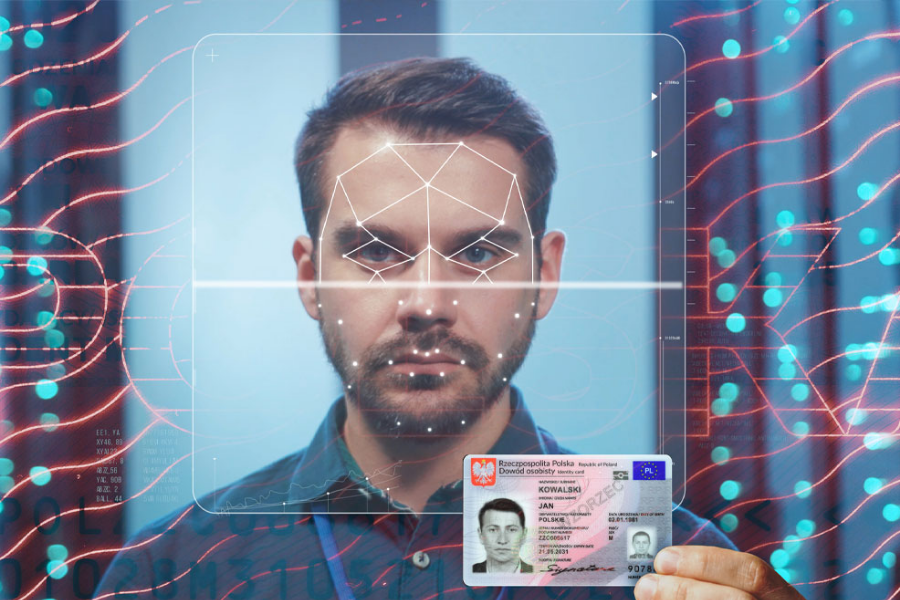Meta Description:
Integrate identity verification in the banking system to uphold the trust and integrity of the overall system, ensure financial security, and prevent potential fraud.
In the United States in 2022, the Federal Trade Commission (FTC) received around 441,822 reports related to credit card and identity fraud. Additionally, an extra 57,877 complaints were filed with the FTC concerning fraud related to government documents and benefits.
Thus, the increasing issue of identity theft has been revolving all over the world, threatening and alarming situations. Therefore, to deter these potential threats and the ongoing problem of identity forgery in the banks, they are required to opt for robust identity verification in order to dissuade identity theft and other financial losses.
This article will explore the potential uses of obligatory KYC verification in banks and through what methods it deter identity fraud.
What is ID Verification?
AI dentity verification is the process of verifying the identities of bank customers while opening their accounts and providing them access. This ensures that identities are not misused by fraudsters and that applicants were not previously involved in illegal activities.
This regulatory process is obligatory for financial institutions to know their customers. ID verification is part of the entire KYC procedure that ensures genuine and authentic clients. It includes verifying personal information such as name, date of birth, and address that is verified against official records.
Validation of Identity And Its Process
The conventional validation of identity for the banks was time-consuming and flawed due to errors. However, in some developing countries, manual and physical identity verification is still practiced. Moreover, the process can be transpired in both spaces digitally and physically. Automation with AI-driven algorithms and machine learning technology has enhanced the efficiency of this process.
Digital identity verification opts for robust automated validation software and authentication techniques that use artificial intelligence (AI). Identity verification involves verifying an individual’s claimed identity by cross-checking submitted personal information and documentation against authoritative data sources.
Digital Identity Verification For Finance
Identity verification is optimal for the financial sector, which requires such solutions to deter discrepancies and economic fraud. The digital identity verification for finance is incorporated with advanced technology to work efficiently for mobile apps. For instance, the fintech apps are integrated with the face recognition technology and OCR for document verification.
The fintech apps require robust security to protect the funds of the user and optimal authentication solutions to ensure safe access to their accounts. Thus, these finance managing apps stay updated and secure from the threats of invading privacy and stolen identity, among other cybercrimes.
KYC Identity Verification Services
There are online KYC identity verification service providers that authenticate users on behalf of banks and other organizations. These solutions make sure that the identities are validated accurately and quickly. They perform an extensive authentication process to ensure the user was never involved in anything illegal before, such as money laundering or terrorist financing. The identity verification services match the provided data with different databases, such as government, bank, watchlist, criminal records, etc.
Validation of Identity With Document Verification
Authentication of ID can be performed with the help of document verification, as it involves authenticating the personal credentials of the applicants. The documents are identity and business documents, bank statements, employment records, etc. The document verification uses optical character recognition (OCR) technology to validate authenticity correctly. The document verification has the following steps:
- Document collection
- Data extraction
- Document validation
- Manual verification
Online Global ID Verification Regulations
Online global ID verification regulations are designed to enhance security and combat fraud in the digital world by establishing standards for verifying individuals’ identities digitally. These regulations often mandate businesses implement robust identity verification processes. They aspire to protect sensitive personal data and avert illegal activities like money laundering and identity theft.
Key regulatory frameworks, such as the EU’s General Data Protection Regulation (GDPR) and the US’s Know Your Customer (KYC) requirements, set rigid guidelines for companies managing and verifying personal information to ensure privacy and security in online transactions globally.
Final Words
Implementing robust KYC identity verification in banks is essential to mitigate financial losses and uphold the integrity of the financial system. The threatening increase in identity theft and fraud emphasizes the necessity for rigorous verification processes. Digital advancements, including AI-driven technologies and biometric authentication, have significantly enhanced the efficiency and accuracy of verified identity . It ensures that financial institutions can reliably authenticate their customers. By adopting these cultivated KYC methods, banks protect their clients from fraud and comply with global regulatory standards, ultimately fostering a secure and trustworthy financial environment.




